HAT304: Report on Sustainability Issues in Hospitality and Tourism
VerifiedAdded on 2022/08/16
|10
|2427
|16
Report
AI Summary
This report delves into the critical sustainability issues impacting the hospitality and tourism sectors, emphasizing the significant role of climate change. It analyzes the environmental, financial, and social impacts of tourism, highlighting legal and regulatory risks, particularly within the Australian context. The report explores how climate change affects tourist behavior and governmental policies, leading to potential implications for the tourism sector. It proposes a comprehensive policy draft, including an Emissions Reduction Fund, energy efficiency strategies, the use of renewable energy, and the establishment of climate advisory agencies. The policy aims to reduce business risks, promote sustainable development, and enhance environmental awareness among stakeholders. The report provides justifications for the recommended policy draft, emphasizing the potential benefits for eco-tourism, reduced energy consumption, and overall improvements in the tourism sector's sustainability. It also references key studies and research in the field.
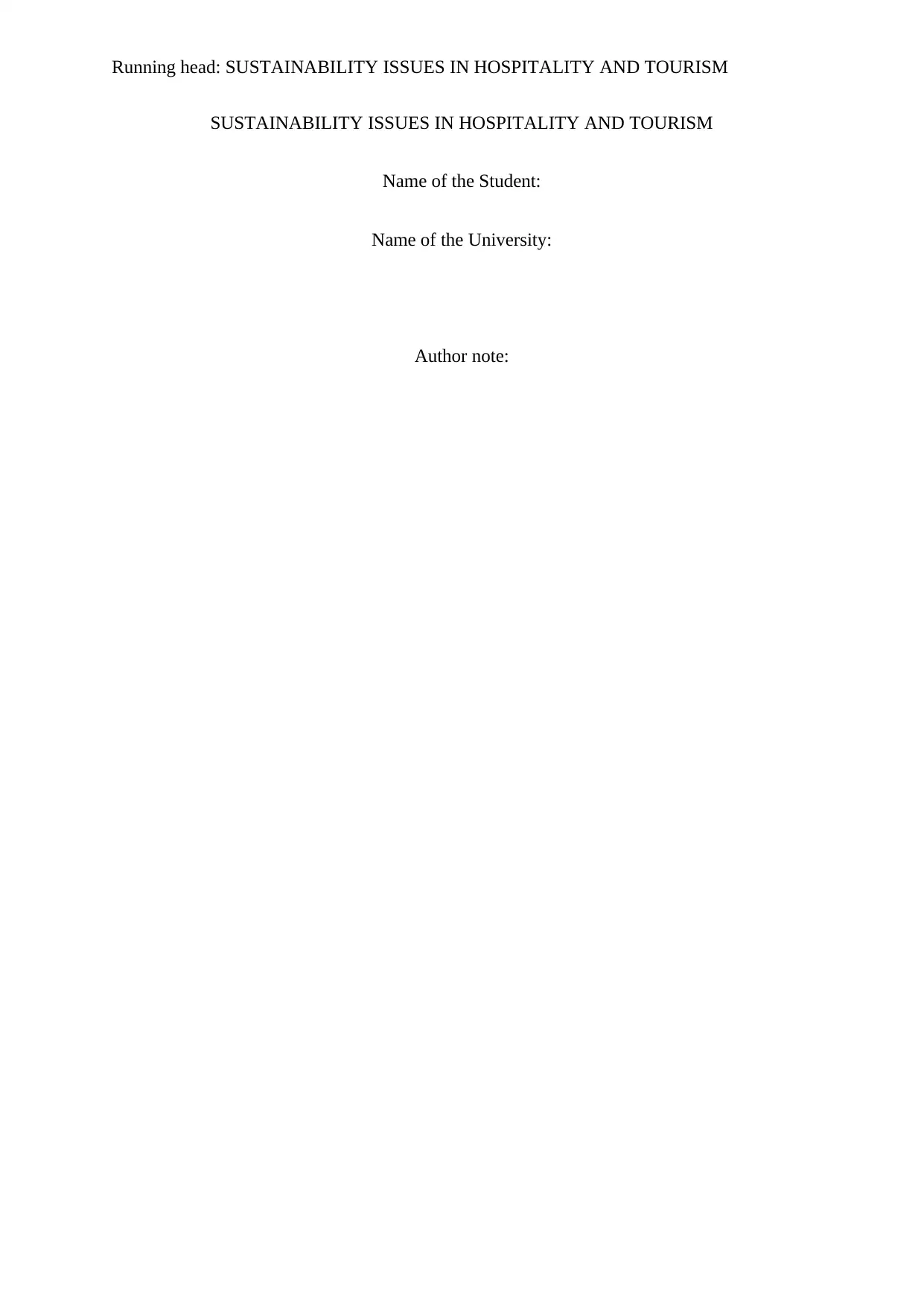
Running head: SUSTAINABILITY ISSUES IN HOSPITALITY AND TOURISM
SUSTAINABILITY ISSUES IN HOSPITALITY AND TOURISM
Name of the Student:
Name of the University:
Author note:
SUSTAINABILITY ISSUES IN HOSPITALITY AND TOURISM
Name of the Student:
Name of the University:
Author note:
Paraphrase This Document
Need a fresh take? Get an instant paraphrase of this document with our AI Paraphraser
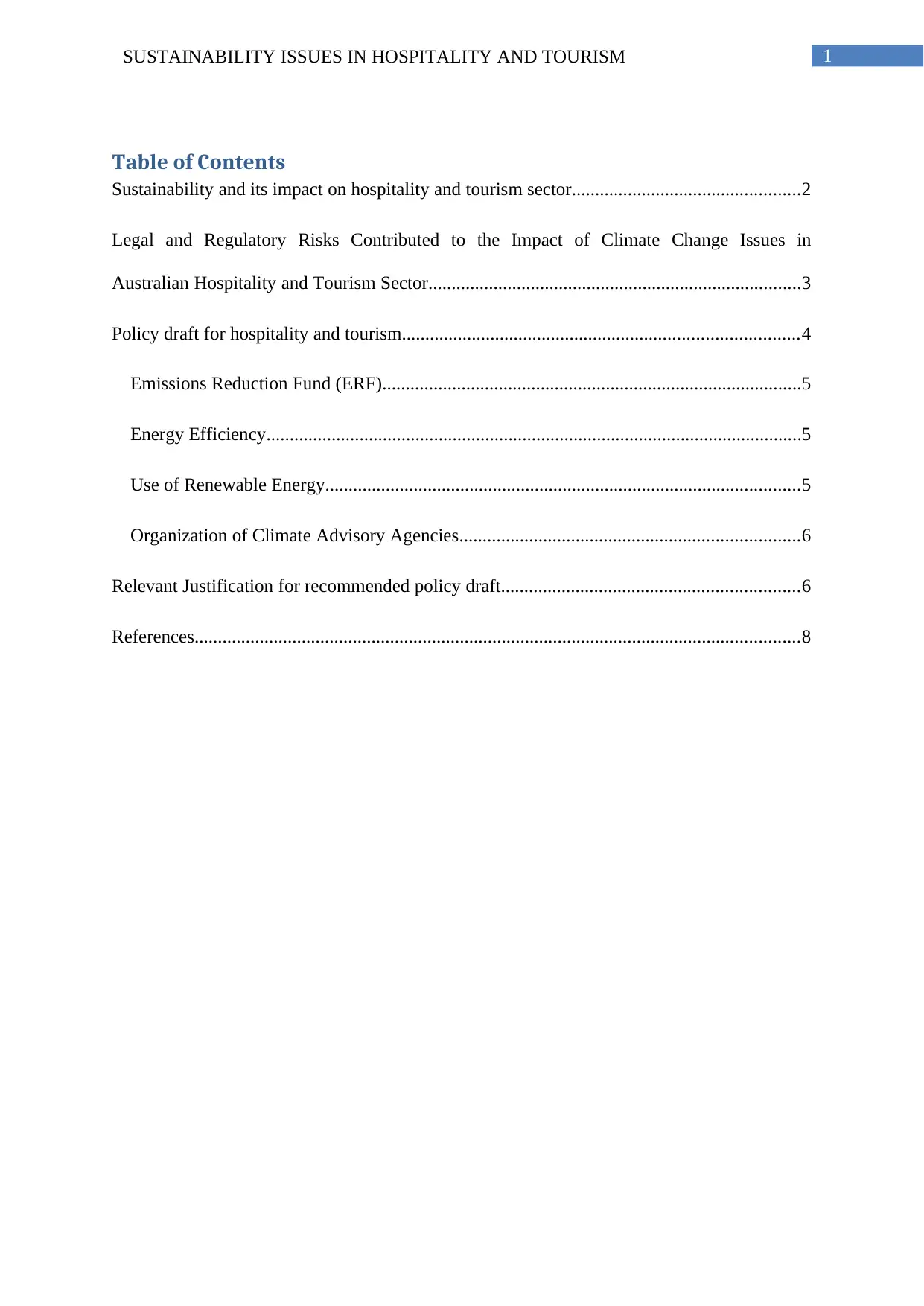
1SUSTAINABILITY ISSUES IN HOSPITALITY AND TOURISM
Table of Contents
Sustainability and its impact on hospitality and tourism sector.................................................2
Legal and Regulatory Risks Contributed to the Impact of Climate Change Issues in
Australian Hospitality and Tourism Sector................................................................................3
Policy draft for hospitality and tourism.....................................................................................4
Emissions Reduction Fund (ERF)..........................................................................................5
Energy Efficiency...................................................................................................................5
Use of Renewable Energy......................................................................................................5
Organization of Climate Advisory Agencies.........................................................................6
Relevant Justification for recommended policy draft................................................................6
References..................................................................................................................................8
Table of Contents
Sustainability and its impact on hospitality and tourism sector.................................................2
Legal and Regulatory Risks Contributed to the Impact of Climate Change Issues in
Australian Hospitality and Tourism Sector................................................................................3
Policy draft for hospitality and tourism.....................................................................................4
Emissions Reduction Fund (ERF)..........................................................................................5
Energy Efficiency...................................................................................................................5
Use of Renewable Energy......................................................................................................5
Organization of Climate Advisory Agencies.........................................................................6
Relevant Justification for recommended policy draft................................................................6
References..................................................................................................................................8
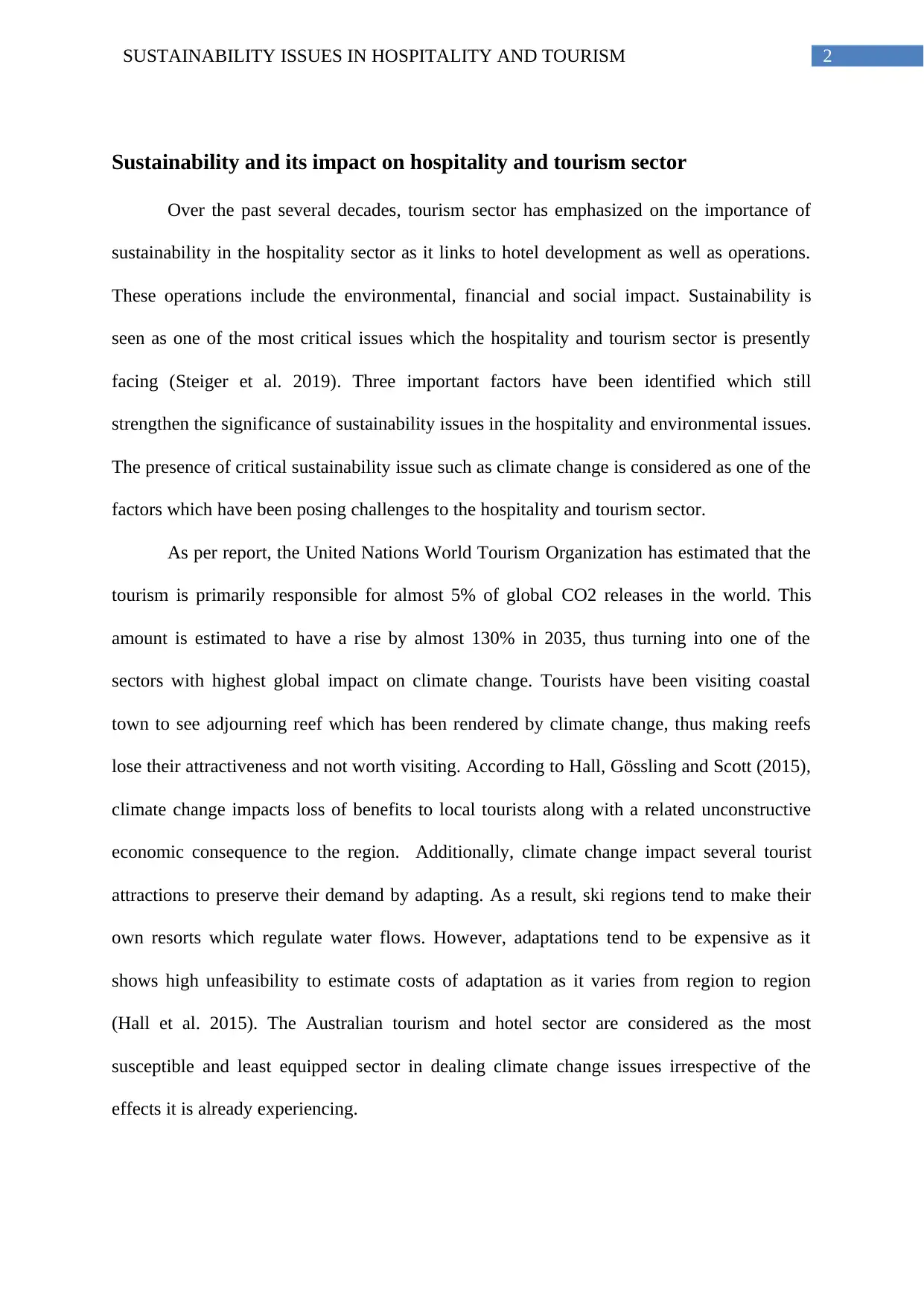
2SUSTAINABILITY ISSUES IN HOSPITALITY AND TOURISM
Sustainability and its impact on hospitality and tourism sector
Over the past several decades, tourism sector has emphasized on the importance of
sustainability in the hospitality sector as it links to hotel development as well as operations.
These operations include the environmental, financial and social impact. Sustainability is
seen as one of the most critical issues which the hospitality and tourism sector is presently
facing (Steiger et al. 2019). Three important factors have been identified which still
strengthen the significance of sustainability issues in the hospitality and environmental issues.
The presence of critical sustainability issue such as climate change is considered as one of the
factors which have been posing challenges to the hospitality and tourism sector.
As per report, the United Nations World Tourism Organization has estimated that the
tourism is primarily responsible for almost 5% of global CO2 releases in the world. This
amount is estimated to have a rise by almost 130% in 2035, thus turning into one of the
sectors with highest global impact on climate change. Tourists have been visiting coastal
town to see adjourning reef which has been rendered by climate change, thus making reefs
lose their attractiveness and not worth visiting. According to Hall, Gössling and Scott (2015),
climate change impacts loss of benefits to local tourists along with a related unconstructive
economic consequence to the region. Additionally, climate change impact several tourist
attractions to preserve their demand by adapting. As a result, ski regions tend to make their
own resorts which regulate water flows. However, adaptations tend to be expensive as it
shows high unfeasibility to estimate costs of adaptation as it varies from region to region
(Hall et al. 2015). The Australian tourism and hotel sector are considered as the most
susceptible and least equipped sector in dealing climate change issues irrespective of the
effects it is already experiencing.
Sustainability and its impact on hospitality and tourism sector
Over the past several decades, tourism sector has emphasized on the importance of
sustainability in the hospitality sector as it links to hotel development as well as operations.
These operations include the environmental, financial and social impact. Sustainability is
seen as one of the most critical issues which the hospitality and tourism sector is presently
facing (Steiger et al. 2019). Three important factors have been identified which still
strengthen the significance of sustainability issues in the hospitality and environmental issues.
The presence of critical sustainability issue such as climate change is considered as one of the
factors which have been posing challenges to the hospitality and tourism sector.
As per report, the United Nations World Tourism Organization has estimated that the
tourism is primarily responsible for almost 5% of global CO2 releases in the world. This
amount is estimated to have a rise by almost 130% in 2035, thus turning into one of the
sectors with highest global impact on climate change. Tourists have been visiting coastal
town to see adjourning reef which has been rendered by climate change, thus making reefs
lose their attractiveness and not worth visiting. According to Hall, Gössling and Scott (2015),
climate change impacts loss of benefits to local tourists along with a related unconstructive
economic consequence to the region. Additionally, climate change impact several tourist
attractions to preserve their demand by adapting. As a result, ski regions tend to make their
own resorts which regulate water flows. However, adaptations tend to be expensive as it
shows high unfeasibility to estimate costs of adaptation as it varies from region to region
(Hall et al. 2015). The Australian tourism and hotel sector are considered as the most
susceptible and least equipped sector in dealing climate change issues irrespective of the
effects it is already experiencing.
⊘ This is a preview!⊘
Do you want full access?
Subscribe today to unlock all pages.

Trusted by 1+ million students worldwide
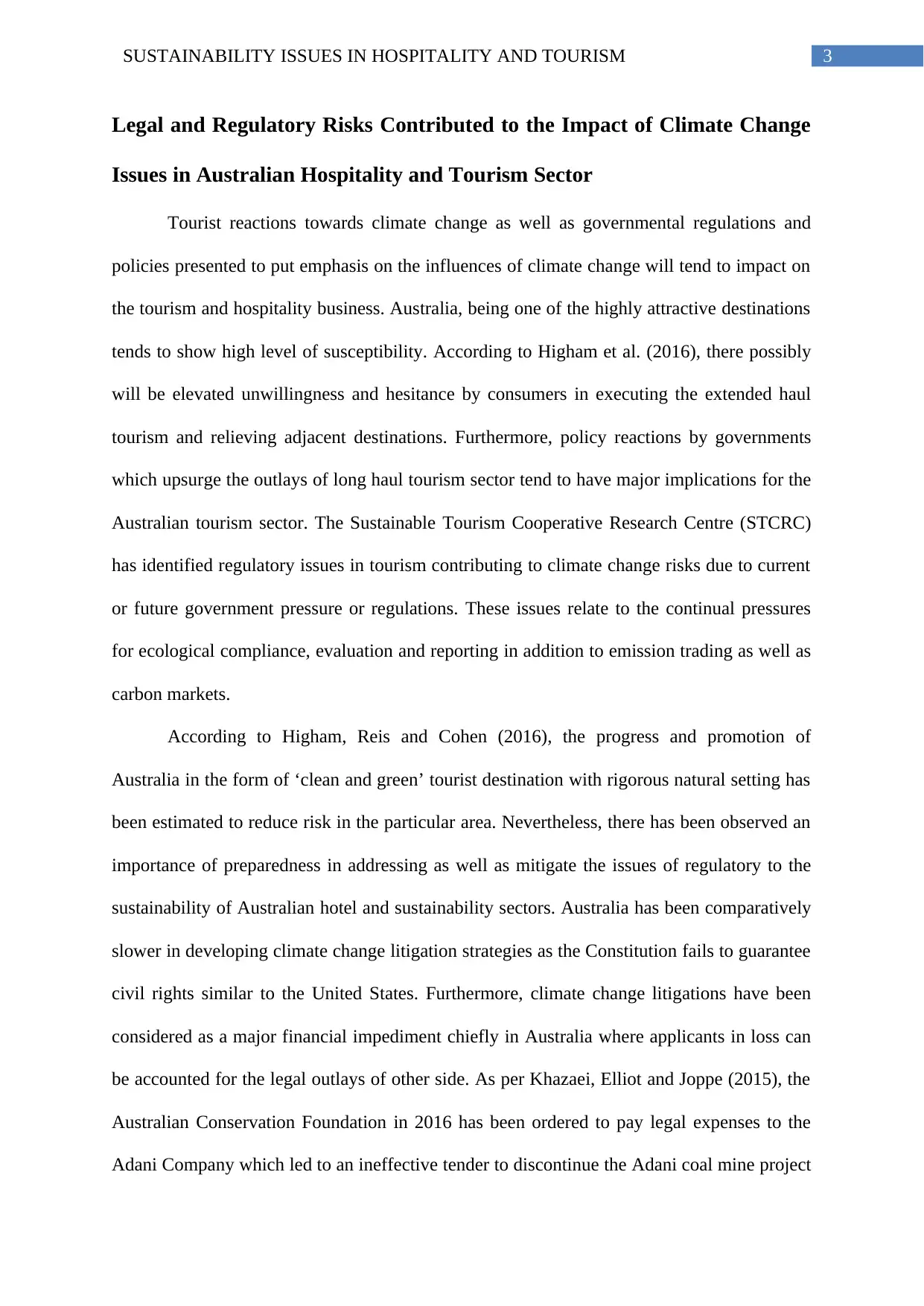
3SUSTAINABILITY ISSUES IN HOSPITALITY AND TOURISM
Legal and Regulatory Risks Contributed to the Impact of Climate Change
Issues in Australian Hospitality and Tourism Sector
Tourist reactions towards climate change as well as governmental regulations and
policies presented to put emphasis on the influences of climate change will tend to impact on
the tourism and hospitality business. Australia, being one of the highly attractive destinations
tends to show high level of susceptibility. According to Higham et al. (2016), there possibly
will be elevated unwillingness and hesitance by consumers in executing the extended haul
tourism and relieving adjacent destinations. Furthermore, policy reactions by governments
which upsurge the outlays of long haul tourism sector tend to have major implications for the
Australian tourism sector. The Sustainable Tourism Cooperative Research Centre (STCRC)
has identified regulatory issues in tourism contributing to climate change risks due to current
or future government pressure or regulations. These issues relate to the continual pressures
for ecological compliance, evaluation and reporting in addition to emission trading as well as
carbon markets.
According to Higham, Reis and Cohen (2016), the progress and promotion of
Australia in the form of ‘clean and green’ tourist destination with rigorous natural setting has
been estimated to reduce risk in the particular area. Nevertheless, there has been observed an
importance of preparedness in addressing as well as mitigate the issues of regulatory to the
sustainability of Australian hotel and sustainability sectors. Australia has been comparatively
slower in developing climate change litigation strategies as the Constitution fails to guarantee
civil rights similar to the United States. Furthermore, climate change litigations have been
considered as a major financial impediment chiefly in Australia where applicants in loss can
be accounted for the legal outlays of other side. As per Khazaei, Elliot and Joppe (2015), the
Australian Conservation Foundation in 2016 has been ordered to pay legal expenses to the
Adani Company which led to an ineffective tender to discontinue the Adani coal mine project
Legal and Regulatory Risks Contributed to the Impact of Climate Change
Issues in Australian Hospitality and Tourism Sector
Tourist reactions towards climate change as well as governmental regulations and
policies presented to put emphasis on the influences of climate change will tend to impact on
the tourism and hospitality business. Australia, being one of the highly attractive destinations
tends to show high level of susceptibility. According to Higham et al. (2016), there possibly
will be elevated unwillingness and hesitance by consumers in executing the extended haul
tourism and relieving adjacent destinations. Furthermore, policy reactions by governments
which upsurge the outlays of long haul tourism sector tend to have major implications for the
Australian tourism sector. The Sustainable Tourism Cooperative Research Centre (STCRC)
has identified regulatory issues in tourism contributing to climate change risks due to current
or future government pressure or regulations. These issues relate to the continual pressures
for ecological compliance, evaluation and reporting in addition to emission trading as well as
carbon markets.
According to Higham, Reis and Cohen (2016), the progress and promotion of
Australia in the form of ‘clean and green’ tourist destination with rigorous natural setting has
been estimated to reduce risk in the particular area. Nevertheless, there has been observed an
importance of preparedness in addressing as well as mitigate the issues of regulatory to the
sustainability of Australian hotel and sustainability sectors. Australia has been comparatively
slower in developing climate change litigation strategies as the Constitution fails to guarantee
civil rights similar to the United States. Furthermore, climate change litigations have been
considered as a major financial impediment chiefly in Australia where applicants in loss can
be accounted for the legal outlays of other side. As per Khazaei, Elliot and Joppe (2015), the
Australian Conservation Foundation in 2016 has been ordered to pay legal expenses to the
Adani Company which led to an ineffective tender to discontinue the Adani coal mine project
Paraphrase This Document
Need a fresh take? Get an instant paraphrase of this document with our AI Paraphraser
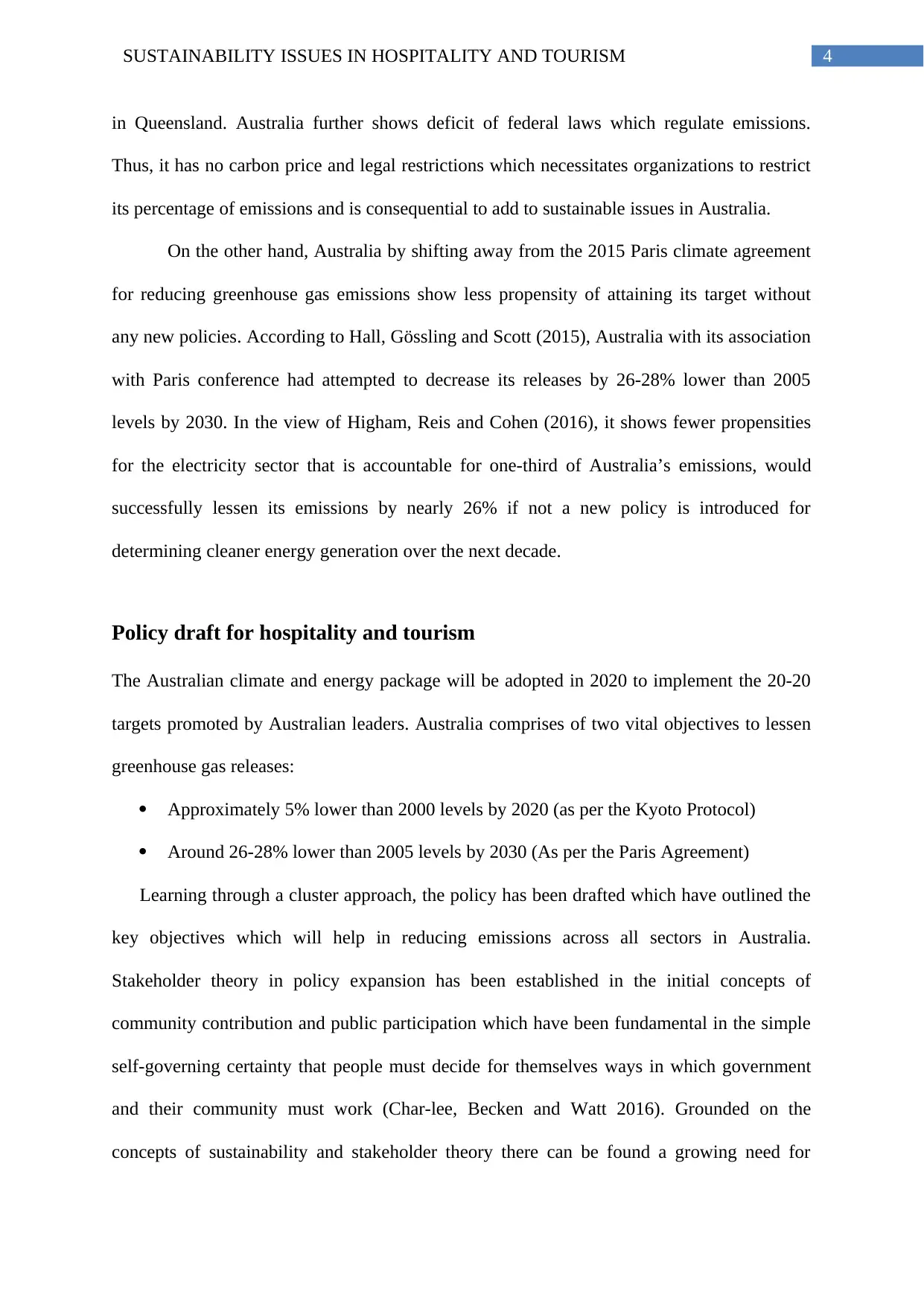
4SUSTAINABILITY ISSUES IN HOSPITALITY AND TOURISM
in Queensland. Australia further shows deficit of federal laws which regulate emissions.
Thus, it has no carbon price and legal restrictions which necessitates organizations to restrict
its percentage of emissions and is consequential to add to sustainable issues in Australia.
On the other hand, Australia by shifting away from the 2015 Paris climate agreement
for reducing greenhouse gas emissions show less propensity of attaining its target without
any new policies. According to Hall, Gössling and Scott (2015), Australia with its association
with Paris conference had attempted to decrease its releases by 26-28% lower than 2005
levels by 2030. In the view of Higham, Reis and Cohen (2016), it shows fewer propensities
for the electricity sector that is accountable for one-third of Australia’s emissions, would
successfully lessen its emissions by nearly 26% if not a new policy is introduced for
determining cleaner energy generation over the next decade.
Policy draft for hospitality and tourism
The Australian climate and energy package will be adopted in 2020 to implement the 20-20
targets promoted by Australian leaders. Australia comprises of two vital objectives to lessen
greenhouse gas releases:
Approximately 5% lower than 2000 levels by 2020 (as per the Kyoto Protocol)
Around 26-28% lower than 2005 levels by 2030 (As per the Paris Agreement)
Learning through a cluster approach, the policy has been drafted which have outlined the
key objectives which will help in reducing emissions across all sectors in Australia.
Stakeholder theory in policy expansion has been established in the initial concepts of
community contribution and public participation which have been fundamental in the simple
self-governing certainty that people must decide for themselves ways in which government
and their community must work (Char-lee, Becken and Watt 2016). Grounded on the
concepts of sustainability and stakeholder theory there can be found a growing need for
in Queensland. Australia further shows deficit of federal laws which regulate emissions.
Thus, it has no carbon price and legal restrictions which necessitates organizations to restrict
its percentage of emissions and is consequential to add to sustainable issues in Australia.
On the other hand, Australia by shifting away from the 2015 Paris climate agreement
for reducing greenhouse gas emissions show less propensity of attaining its target without
any new policies. According to Hall, Gössling and Scott (2015), Australia with its association
with Paris conference had attempted to decrease its releases by 26-28% lower than 2005
levels by 2030. In the view of Higham, Reis and Cohen (2016), it shows fewer propensities
for the electricity sector that is accountable for one-third of Australia’s emissions, would
successfully lessen its emissions by nearly 26% if not a new policy is introduced for
determining cleaner energy generation over the next decade.
Policy draft for hospitality and tourism
The Australian climate and energy package will be adopted in 2020 to implement the 20-20
targets promoted by Australian leaders. Australia comprises of two vital objectives to lessen
greenhouse gas releases:
Approximately 5% lower than 2000 levels by 2020 (as per the Kyoto Protocol)
Around 26-28% lower than 2005 levels by 2030 (As per the Paris Agreement)
Learning through a cluster approach, the policy has been drafted which have outlined the
key objectives which will help in reducing emissions across all sectors in Australia.
Stakeholder theory in policy expansion has been established in the initial concepts of
community contribution and public participation which have been fundamental in the simple
self-governing certainty that people must decide for themselves ways in which government
and their community must work (Char-lee, Becken and Watt 2016). Grounded on the
concepts of sustainability and stakeholder theory there can be found a growing need for
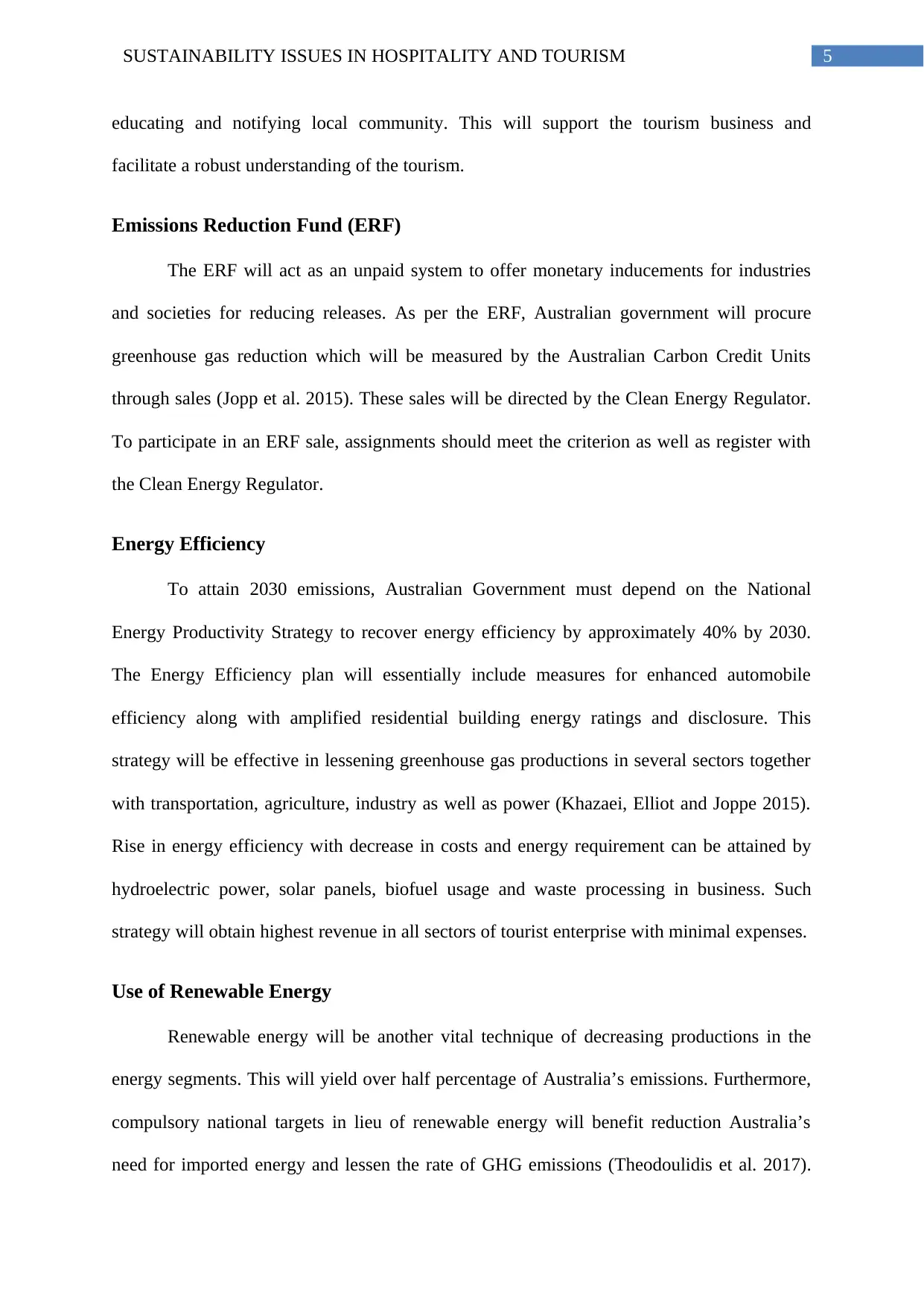
5SUSTAINABILITY ISSUES IN HOSPITALITY AND TOURISM
educating and notifying local community. This will support the tourism business and
facilitate a robust understanding of the tourism.
Emissions Reduction Fund (ERF)
The ERF will act as an unpaid system to offer monetary inducements for industries
and societies for reducing releases. As per the ERF, Australian government will procure
greenhouse gas reduction which will be measured by the Australian Carbon Credit Units
through sales (Jopp et al. 2015). These sales will be directed by the Clean Energy Regulator.
To participate in an ERF sale, assignments should meet the criterion as well as register with
the Clean Energy Regulator.
Energy Efficiency
To attain 2030 emissions, Australian Government must depend on the National
Energy Productivity Strategy to recover energy efficiency by approximately 40% by 2030.
The Energy Efficiency plan will essentially include measures for enhanced automobile
efficiency along with amplified residential building energy ratings and disclosure. This
strategy will be effective in lessening greenhouse gas productions in several sectors together
with transportation, agriculture, industry as well as power (Khazaei, Elliot and Joppe 2015).
Rise in energy efficiency with decrease in costs and energy requirement can be attained by
hydroelectric power, solar panels, biofuel usage and waste processing in business. Such
strategy will obtain highest revenue in all sectors of tourist enterprise with minimal expenses.
Use of Renewable Energy
Renewable energy will be another vital technique of decreasing productions in the
energy segments. This will yield over half percentage of Australia’s emissions. Furthermore,
compulsory national targets in lieu of renewable energy will benefit reduction Australia’s
need for imported energy and lessen the rate of GHG emissions (Theodoulidis et al. 2017).
educating and notifying local community. This will support the tourism business and
facilitate a robust understanding of the tourism.
Emissions Reduction Fund (ERF)
The ERF will act as an unpaid system to offer monetary inducements for industries
and societies for reducing releases. As per the ERF, Australian government will procure
greenhouse gas reduction which will be measured by the Australian Carbon Credit Units
through sales (Jopp et al. 2015). These sales will be directed by the Clean Energy Regulator.
To participate in an ERF sale, assignments should meet the criterion as well as register with
the Clean Energy Regulator.
Energy Efficiency
To attain 2030 emissions, Australian Government must depend on the National
Energy Productivity Strategy to recover energy efficiency by approximately 40% by 2030.
The Energy Efficiency plan will essentially include measures for enhanced automobile
efficiency along with amplified residential building energy ratings and disclosure. This
strategy will be effective in lessening greenhouse gas productions in several sectors together
with transportation, agriculture, industry as well as power (Khazaei, Elliot and Joppe 2015).
Rise in energy efficiency with decrease in costs and energy requirement can be attained by
hydroelectric power, solar panels, biofuel usage and waste processing in business. Such
strategy will obtain highest revenue in all sectors of tourist enterprise with minimal expenses.
Use of Renewable Energy
Renewable energy will be another vital technique of decreasing productions in the
energy segments. This will yield over half percentage of Australia’s emissions. Furthermore,
compulsory national targets in lieu of renewable energy will benefit reduction Australia’s
need for imported energy and lessen the rate of GHG emissions (Theodoulidis et al. 2017).
⊘ This is a preview!⊘
Do you want full access?
Subscribe today to unlock all pages.

Trusted by 1+ million students worldwide
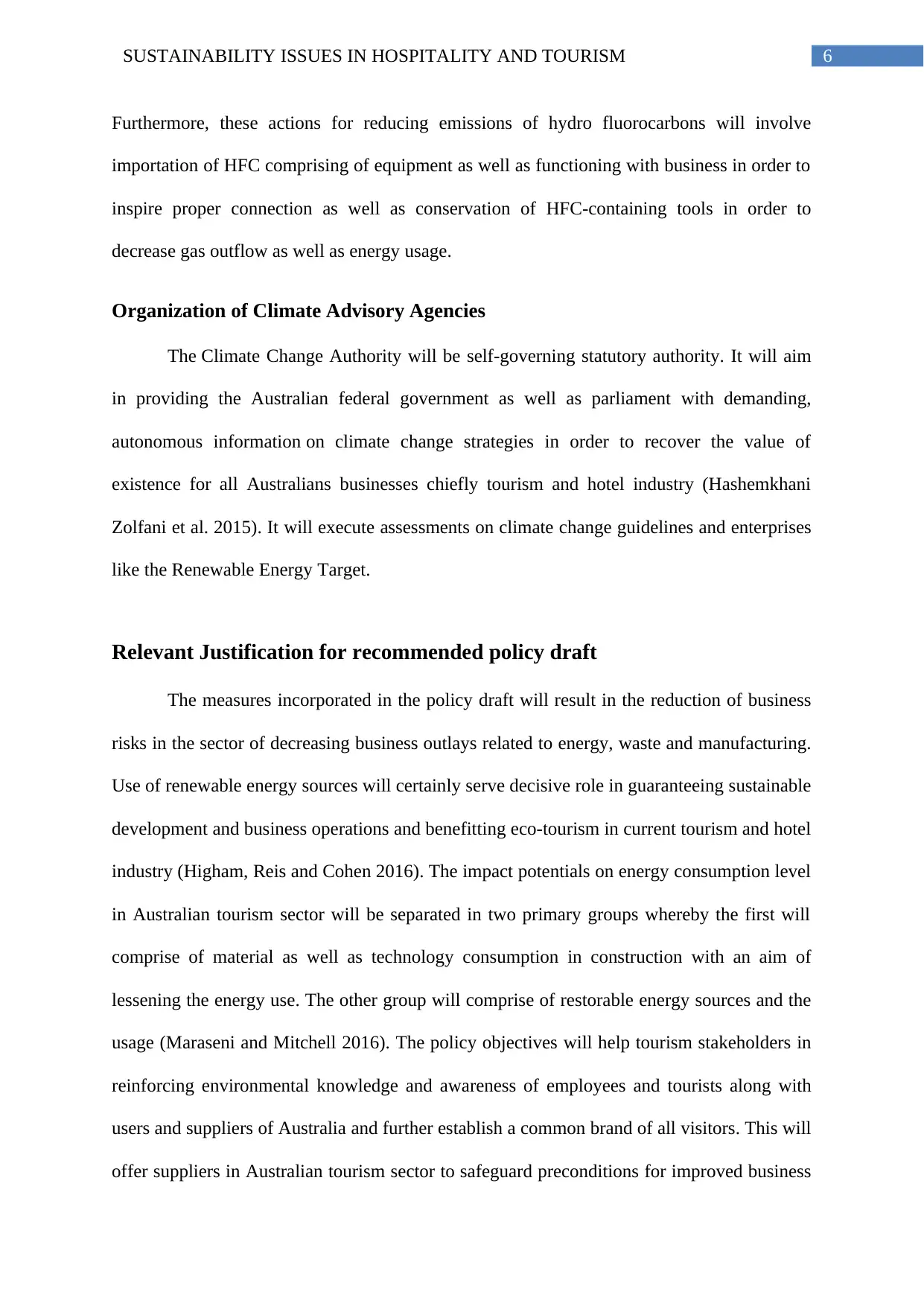
6SUSTAINABILITY ISSUES IN HOSPITALITY AND TOURISM
Furthermore, these actions for reducing emissions of hydro fluorocarbons will involve
importation of HFC comprising of equipment as well as functioning with business in order to
inspire proper connection as well as conservation of HFC-containing tools in order to
decrease gas outflow as well as energy usage.
Organization of Climate Advisory Agencies
The Climate Change Authority will be self-governing statutory authority. It will aim
in providing the Australian federal government as well as parliament with demanding,
autonomous information on climate change strategies in order to recover the value of
existence for all Australians businesses chiefly tourism and hotel industry (Hashemkhani
Zolfani et al. 2015). It will execute assessments on climate change guidelines and enterprises
like the Renewable Energy Target.
Relevant Justification for recommended policy draft
The measures incorporated in the policy draft will result in the reduction of business
risks in the sector of decreasing business outlays related to energy, waste and manufacturing.
Use of renewable energy sources will certainly serve decisive role in guaranteeing sustainable
development and business operations and benefitting eco-tourism in current tourism and hotel
industry (Higham, Reis and Cohen 2016). The impact potentials on energy consumption level
in Australian tourism sector will be separated in two primary groups whereby the first will
comprise of material as well as technology consumption in construction with an aim of
lessening the energy use. The other group will comprise of restorable energy sources and the
usage (Maraseni and Mitchell 2016). The policy objectives will help tourism stakeholders in
reinforcing environmental knowledge and awareness of employees and tourists along with
users and suppliers of Australia and further establish a common brand of all visitors. This will
offer suppliers in Australian tourism sector to safeguard preconditions for improved business
Furthermore, these actions for reducing emissions of hydro fluorocarbons will involve
importation of HFC comprising of equipment as well as functioning with business in order to
inspire proper connection as well as conservation of HFC-containing tools in order to
decrease gas outflow as well as energy usage.
Organization of Climate Advisory Agencies
The Climate Change Authority will be self-governing statutory authority. It will aim
in providing the Australian federal government as well as parliament with demanding,
autonomous information on climate change strategies in order to recover the value of
existence for all Australians businesses chiefly tourism and hotel industry (Hashemkhani
Zolfani et al. 2015). It will execute assessments on climate change guidelines and enterprises
like the Renewable Energy Target.
Relevant Justification for recommended policy draft
The measures incorporated in the policy draft will result in the reduction of business
risks in the sector of decreasing business outlays related to energy, waste and manufacturing.
Use of renewable energy sources will certainly serve decisive role in guaranteeing sustainable
development and business operations and benefitting eco-tourism in current tourism and hotel
industry (Higham, Reis and Cohen 2016). The impact potentials on energy consumption level
in Australian tourism sector will be separated in two primary groups whereby the first will
comprise of material as well as technology consumption in construction with an aim of
lessening the energy use. The other group will comprise of restorable energy sources and the
usage (Maraseni and Mitchell 2016). The policy objectives will help tourism stakeholders in
reinforcing environmental knowledge and awareness of employees and tourists along with
users and suppliers of Australia and further establish a common brand of all visitors. This will
offer suppliers in Australian tourism sector to safeguard preconditions for improved business
Paraphrase This Document
Need a fresh take? Get an instant paraphrase of this document with our AI Paraphraser
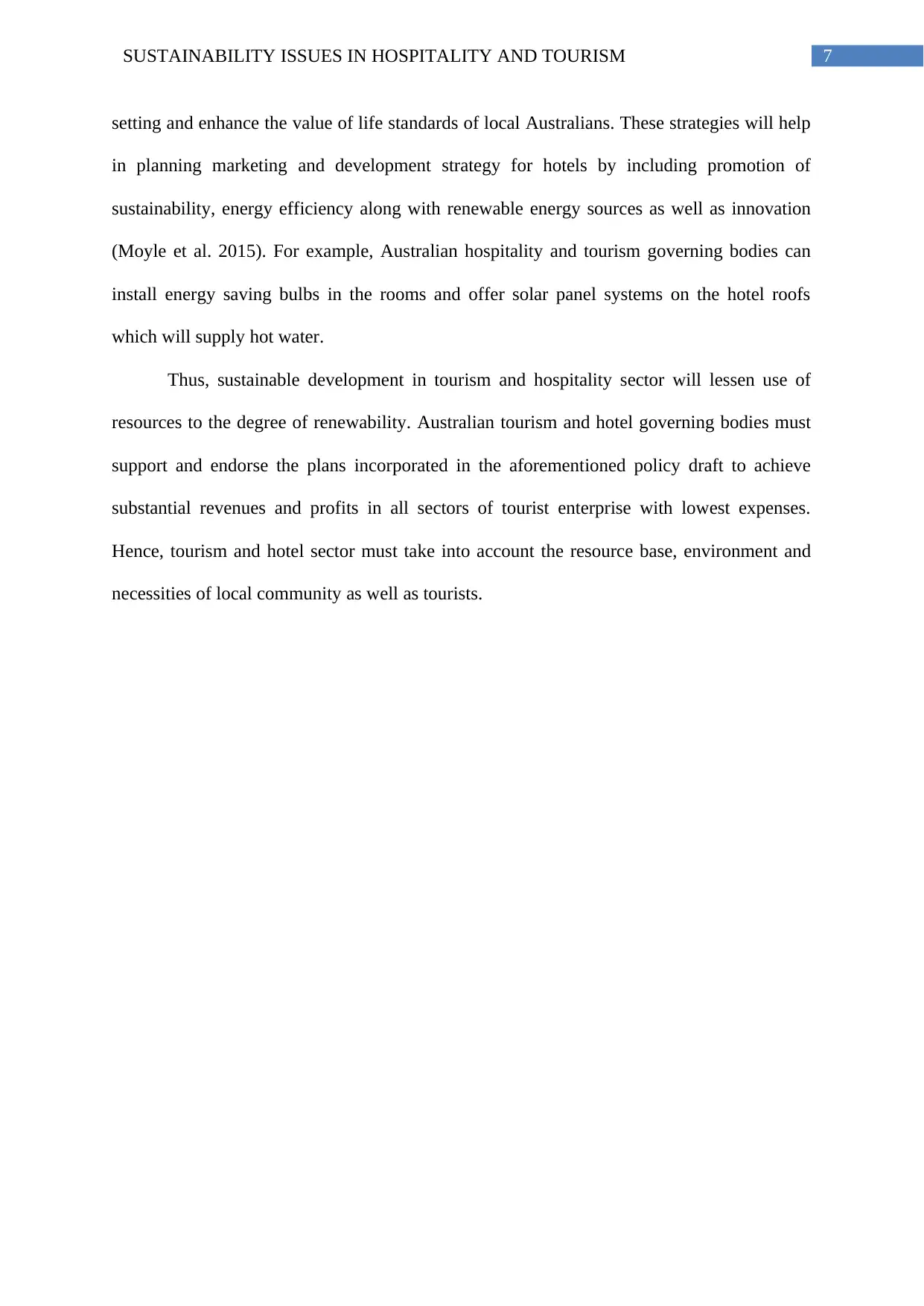
7SUSTAINABILITY ISSUES IN HOSPITALITY AND TOURISM
setting and enhance the value of life standards of local Australians. These strategies will help
in planning marketing and development strategy for hotels by including promotion of
sustainability, energy efficiency along with renewable energy sources as well as innovation
(Moyle et al. 2015). For example, Australian hospitality and tourism governing bodies can
install energy saving bulbs in the rooms and offer solar panel systems on the hotel roofs
which will supply hot water.
Thus, sustainable development in tourism and hospitality sector will lessen use of
resources to the degree of renewability. Australian tourism and hotel governing bodies must
support and endorse the plans incorporated in the aforementioned policy draft to achieve
substantial revenues and profits in all sectors of tourist enterprise with lowest expenses.
Hence, tourism and hotel sector must take into account the resource base, environment and
necessities of local community as well as tourists.
setting and enhance the value of life standards of local Australians. These strategies will help
in planning marketing and development strategy for hotels by including promotion of
sustainability, energy efficiency along with renewable energy sources as well as innovation
(Moyle et al. 2015). For example, Australian hospitality and tourism governing bodies can
install energy saving bulbs in the rooms and offer solar panel systems on the hotel roofs
which will supply hot water.
Thus, sustainable development in tourism and hospitality sector will lessen use of
resources to the degree of renewability. Australian tourism and hotel governing bodies must
support and endorse the plans incorporated in the aforementioned policy draft to achieve
substantial revenues and profits in all sectors of tourist enterprise with lowest expenses.
Hence, tourism and hotel sector must take into account the resource base, environment and
necessities of local community as well as tourists.
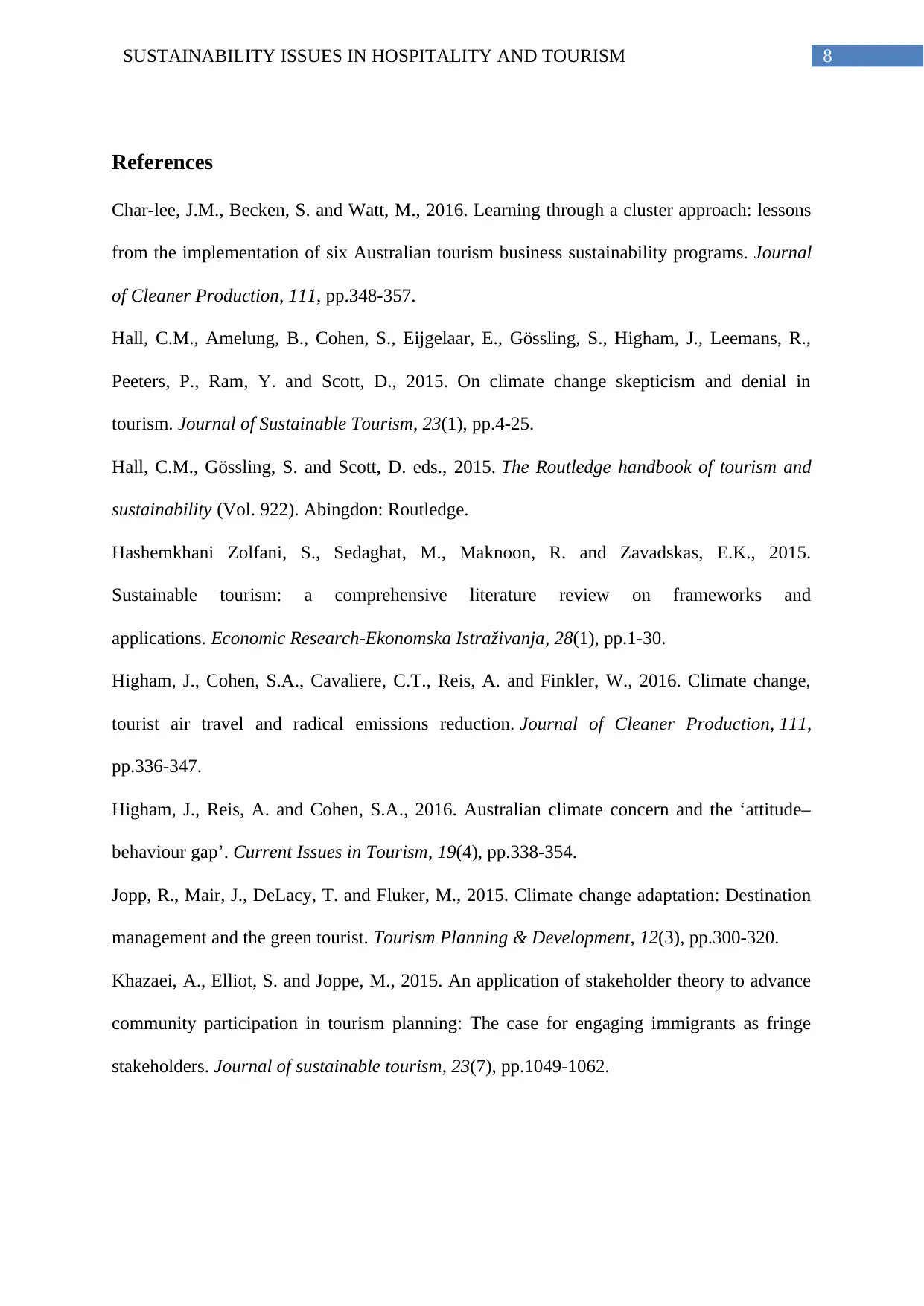
8SUSTAINABILITY ISSUES IN HOSPITALITY AND TOURISM
References
Char-lee, J.M., Becken, S. and Watt, M., 2016. Learning through a cluster approach: lessons
from the implementation of six Australian tourism business sustainability programs. Journal
of Cleaner Production, 111, pp.348-357.
Hall, C.M., Amelung, B., Cohen, S., Eijgelaar, E., Gössling, S., Higham, J., Leemans, R.,
Peeters, P., Ram, Y. and Scott, D., 2015. On climate change skepticism and denial in
tourism. Journal of Sustainable Tourism, 23(1), pp.4-25.
Hall, C.M., Gössling, S. and Scott, D. eds., 2015. The Routledge handbook of tourism and
sustainability (Vol. 922). Abingdon: Routledge.
Hashemkhani Zolfani, S., Sedaghat, M., Maknoon, R. and Zavadskas, E.K., 2015.
Sustainable tourism: a comprehensive literature review on frameworks and
applications. Economic Research-Ekonomska Istraživanja, 28(1), pp.1-30.
Higham, J., Cohen, S.A., Cavaliere, C.T., Reis, A. and Finkler, W., 2016. Climate change,
tourist air travel and radical emissions reduction. Journal of Cleaner Production, 111,
pp.336-347.
Higham, J., Reis, A. and Cohen, S.A., 2016. Australian climate concern and the ‘attitude–
behaviour gap’. Current Issues in Tourism, 19(4), pp.338-354.
Jopp, R., Mair, J., DeLacy, T. and Fluker, M., 2015. Climate change adaptation: Destination
management and the green tourist. Tourism Planning & Development, 12(3), pp.300-320.
Khazaei, A., Elliot, S. and Joppe, M., 2015. An application of stakeholder theory to advance
community participation in tourism planning: The case for engaging immigrants as fringe
stakeholders. Journal of sustainable tourism, 23(7), pp.1049-1062.
References
Char-lee, J.M., Becken, S. and Watt, M., 2016. Learning through a cluster approach: lessons
from the implementation of six Australian tourism business sustainability programs. Journal
of Cleaner Production, 111, pp.348-357.
Hall, C.M., Amelung, B., Cohen, S., Eijgelaar, E., Gössling, S., Higham, J., Leemans, R.,
Peeters, P., Ram, Y. and Scott, D., 2015. On climate change skepticism and denial in
tourism. Journal of Sustainable Tourism, 23(1), pp.4-25.
Hall, C.M., Gössling, S. and Scott, D. eds., 2015. The Routledge handbook of tourism and
sustainability (Vol. 922). Abingdon: Routledge.
Hashemkhani Zolfani, S., Sedaghat, M., Maknoon, R. and Zavadskas, E.K., 2015.
Sustainable tourism: a comprehensive literature review on frameworks and
applications. Economic Research-Ekonomska Istraživanja, 28(1), pp.1-30.
Higham, J., Cohen, S.A., Cavaliere, C.T., Reis, A. and Finkler, W., 2016. Climate change,
tourist air travel and radical emissions reduction. Journal of Cleaner Production, 111,
pp.336-347.
Higham, J., Reis, A. and Cohen, S.A., 2016. Australian climate concern and the ‘attitude–
behaviour gap’. Current Issues in Tourism, 19(4), pp.338-354.
Jopp, R., Mair, J., DeLacy, T. and Fluker, M., 2015. Climate change adaptation: Destination
management and the green tourist. Tourism Planning & Development, 12(3), pp.300-320.
Khazaei, A., Elliot, S. and Joppe, M., 2015. An application of stakeholder theory to advance
community participation in tourism planning: The case for engaging immigrants as fringe
stakeholders. Journal of sustainable tourism, 23(7), pp.1049-1062.
⊘ This is a preview!⊘
Do you want full access?
Subscribe today to unlock all pages.

Trusted by 1+ million students worldwide
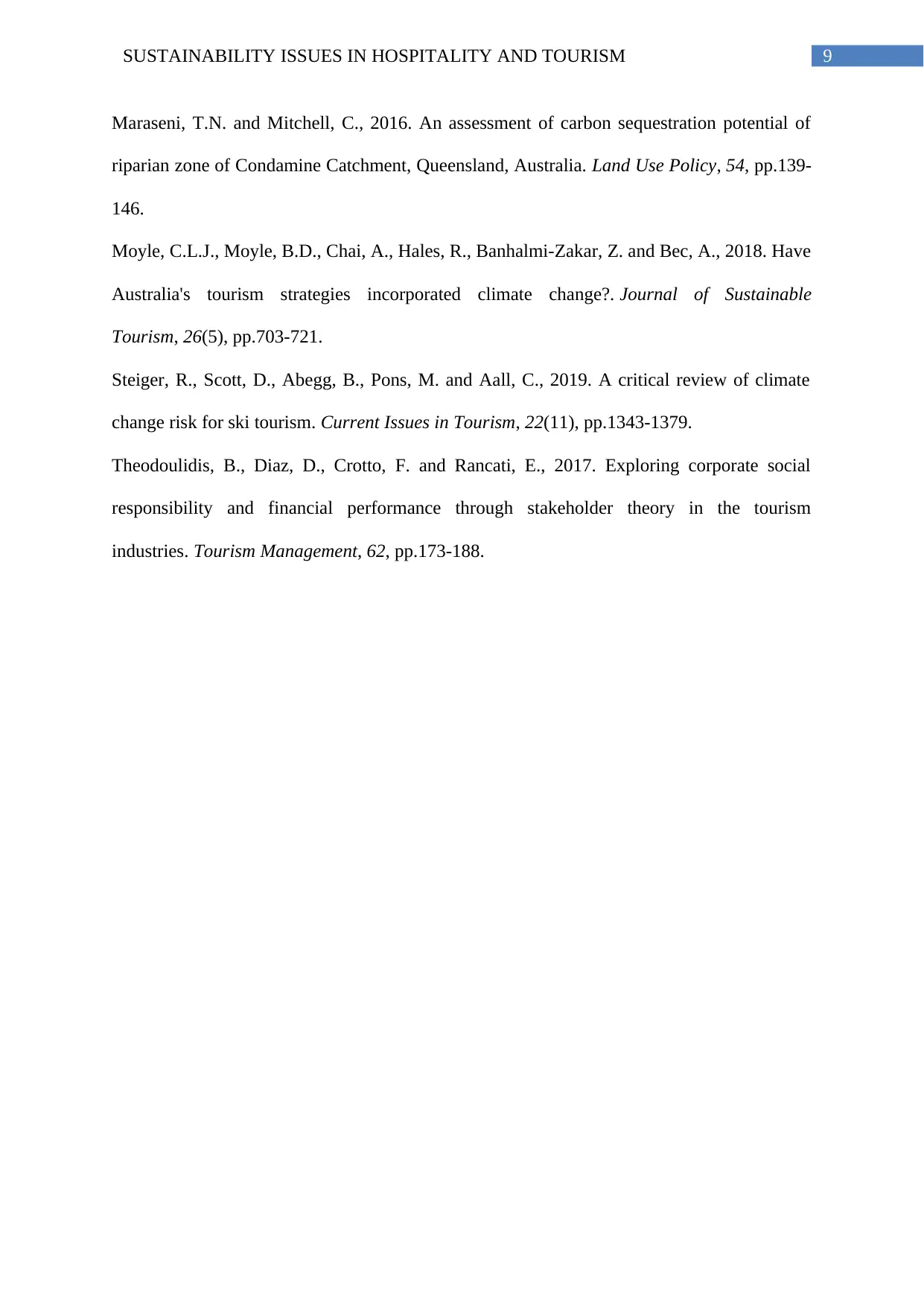
9SUSTAINABILITY ISSUES IN HOSPITALITY AND TOURISM
Maraseni, T.N. and Mitchell, C., 2016. An assessment of carbon sequestration potential of
riparian zone of Condamine Catchment, Queensland, Australia. Land Use Policy, 54, pp.139-
146.
Moyle, C.L.J., Moyle, B.D., Chai, A., Hales, R., Banhalmi-Zakar, Z. and Bec, A., 2018. Have
Australia's tourism strategies incorporated climate change?. Journal of Sustainable
Tourism, 26(5), pp.703-721.
Steiger, R., Scott, D., Abegg, B., Pons, M. and Aall, C., 2019. A critical review of climate
change risk for ski tourism. Current Issues in Tourism, 22(11), pp.1343-1379.
Theodoulidis, B., Diaz, D., Crotto, F. and Rancati, E., 2017. Exploring corporate social
responsibility and financial performance through stakeholder theory in the tourism
industries. Tourism Management, 62, pp.173-188.
Maraseni, T.N. and Mitchell, C., 2016. An assessment of carbon sequestration potential of
riparian zone of Condamine Catchment, Queensland, Australia. Land Use Policy, 54, pp.139-
146.
Moyle, C.L.J., Moyle, B.D., Chai, A., Hales, R., Banhalmi-Zakar, Z. and Bec, A., 2018. Have
Australia's tourism strategies incorporated climate change?. Journal of Sustainable
Tourism, 26(5), pp.703-721.
Steiger, R., Scott, D., Abegg, B., Pons, M. and Aall, C., 2019. A critical review of climate
change risk for ski tourism. Current Issues in Tourism, 22(11), pp.1343-1379.
Theodoulidis, B., Diaz, D., Crotto, F. and Rancati, E., 2017. Exploring corporate social
responsibility and financial performance through stakeholder theory in the tourism
industries. Tourism Management, 62, pp.173-188.
1 out of 10
Related Documents
Your All-in-One AI-Powered Toolkit for Academic Success.
+13062052269
info@desklib.com
Available 24*7 on WhatsApp / Email
![[object Object]](/_next/static/media/star-bottom.7253800d.svg)
Unlock your academic potential
Copyright © 2020–2026 A2Z Services. All Rights Reserved. Developed and managed by ZUCOL.





